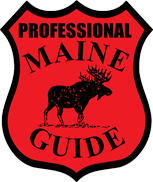So, you want to become a registered Maine guide?
Maine state law defines "Guide" as any person who receives any form of remuneration for his services in accompanying or assisting any person in the fields, forests or on the waters or ice within the jurisdiction of the State while hunting, fishing, trapping, boating, snowmobiling or camping at a primitive camping area.
The tradition of guiding has a deeper, richer definition. They are the men and women who wear a guide patch with pride putting the law, safety, ethics, and conservation before all else. It is their job to create safe and memorable experiences. They are often colorful characters with a lifetime of adventures from which to weave their stories. The best are very good at locating fish and game but also know that success is not defined by a filled tag or creel. They can navigate a rain-filled river then cook a meal over an open fire. They work through the most stressful situations with confidence and nerves of steel.
On March 19, 1897, the Maine legislature passed a bill requiring hunting and fishing guides to register with the state on. The first Maine guide license was issued to Cornilia Thurza Crosby, or “Fly Rod”. Maine registered 1316 guides in that first year.
Big game hunting and inland fishing were the mainstays of the early guiding industry. Imagine “sports” arriving at a remote railroad station from distant places like New York, Philadelphia, or Boston. They were greeted by their guide then they and their gear loaded on a stage or buckboard for a ride over bumpy roads to their destination or to a waterway to continue on their journey further in to Maine’s wild country, negotiating streams, rivers, lakes and ponds to arrive at a Maine sporting camp. Often their stays lasted weeks or months!
For many years, a Maine guide was not required to submit to any standardized testing. Interested parties simply had to pass muster with the local game warden. If you were considered qualified and fit to guide in the outdoors, you were duly registered as a Maine guide. In 1975, a standardized test and procedure was established for licensing of Maine guides.
There are currently approximately 5000 licensed Maine guides. Many carry on the tradition of guiding out of a sporting camp while others operate as independent contractors.
If you think you’re up for the job of a registered Maine guide, read on…
Guides are licensed in one or more specialized classifications:
Hunting (may guide hunting and trapping activities, including overnight camping trips in conjunction with those hunting and trapping activities.)
Fishing (may guide fishing activities, including overnight camping trips in conjunction with those fishing activities on inland waters.)
Recreational (may guide boating, snowmobiling and camping activities.)
Sea-Kayaking (may guide sea-kayaking including overnight camping trips in conjunction with those sea-kayaking activities.)
Tide-Water Fishing (may guide sport fishing on the open waters of the ocean. This classification also requires a U.S. Coast Guard license.
Master certification means a person has acquired experience in a specialized classification that exceeds the minimum requirements necessary to be licensed as a guide in that classification.
FOR MORE INFORMATION ON CLASSIFICATIONS, GO TO: http://www.maine.gov/ifw/programs-resources/registered-maine-guides.html#classifications
There is a rigorous testing process to become a registered Maine guide. To start, all new applicants must be currently certified by the American Red Cross in standard first-aid or a similar and approved course. If you have completed or hold a first-aid card you may continue with the application process by completing the Maine Guide Application, submitting proof of first-aid certification, and necessary payment.
Maine Guide Application: http://www.maine.gov/ifw/docs/guide_2017.pdf
Whitewater Guide Application: http://www.maine.gov/ifw/docs/whitewater_guide_2017.pdf
It is assumed you have the practical experience necessary to become a Maine guide and you will be tested on that in the oral portion of the exam. However, you are also expected to be familiar with all the laws relating to the classification on which you will be tested. You can obtain study documents and resources at: http://www.maine.gov/ifw/programs-resources/guide-resources.html#resources
Any licensed guide will tell you to study, study, and study some more before testing! If you aren’t confident with a map and compass or navigation you should seek training from an expert with these skills because you will be asked to demonstrate proficiency with a map and compass (or navigation for sea kayaking and tide water fishing) in the oral portion of the exam. You will be quizzed about a lost-person scenario and will be expected to describe what you would do in such a situation. It is a “role-playing” exercise where every scenario and answer leads to the next, until examiners are confident you would know how to conduct a search for a lost client.
If you fail the map and compass (or navigation) or the lost person scenario portion of the oral examination you will be immediately notified and the examination will cease.
If you pass those two portions the examination will continue with the remaining portions of the oral examination. NOTE: Applicants who fail to appear for a scheduled oral examination without notifying the board of examiners in writing or telecommunication 24 hours prior to the scheduled examination will be ineligible for rescheduling for at least one year.
Once you have successfully passed all portions of the oral exam, you will be eligible to take the written exam. You will be expected to complete a written exam in each license classification for which you applied and with a passing score of 70% or higher.
FOR MORE INFORMATION ABOUT TESTING AND FEES, GO TO: http://www.maine.gov/ifw/programs-resources/registered-maine-guides.html#testingandfees


